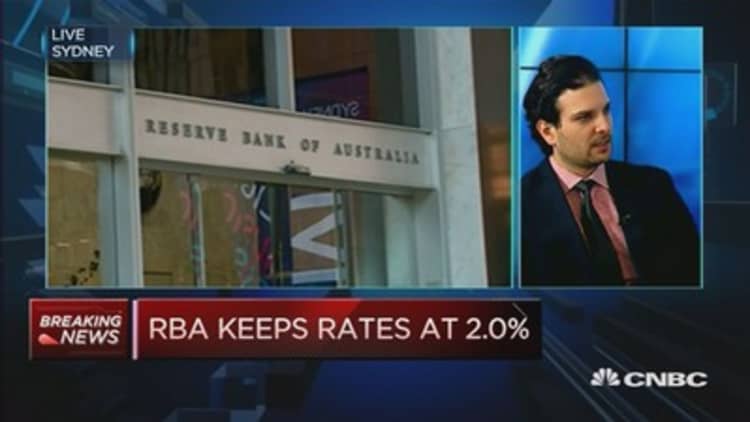
Australia's central bank kept interest rates steady at a record low 2.0 percent, in line with analysts' expectations, but the Australian dollar still pushed higher.
"There are a lot of factors influencing the currency. One of those is probably tomorrow, the GDP (gross domestic product) number for the first quarter. It's probably going to be very strong," Matthew Circosta, an analyst at Moody's Analytics, told CNBC. "But moving forward, you'll see that Aussie dollar weakness coming through in the next few months, because the U.S. is going to be raising interest rates."
All 24 economists polled by Reuters had expected the Reserve Bank of Australia (RBA) to be on hold, but eight respondents said interest rates could be reduced to 1.75 percent or lower by December, if non-mining business investments remain subdued.
Despite the RBA saying it believes further decline in the local currency was both likely and necessary, the Australian dollar strengthened 0.4 percent to trade at $0.7654, from $0.7628 prior to the data. The benchmark S&P ASX 200 index widened losses slightly to fall 1.3 percent, touching an eight-day low.
Traders may believe the RBA hasn't done enough to push the Aussie dollar lower, Stan Shamu, market strategist at IG, said in a note Tuesday. But he expects the rise in the local currency to reverse as it remains in a downtrend and the U.S. dollar has been appreciating.
"The smart money will be eyeing fresh shorting opportunities in the pair," Shamu said.
Some believe traders may be misinterpreting the RBA's statement about adjusting its policy stance depending on upcoming data.
"Although the door for more loosening has been left open, there was no hint that the RBA is currently considering following the cuts in rates in February and May with further reductions in the coming months. This will prompt some to conclude that rates have reached a floor," Paul Dales, chief Australia and New Zealand economist at Capital Economics, said in a note Tuesday. "We disagree," he said adding that the recent data likely just hasn't materially altered the RBA's forecasts.
The RBA's on-hold decision "is nothing more than a pause in the loosening cycle that could yet result in rates falling to 1.5 percent by the end of the year. Such a move would catch the markets on the hop," Dales said. He expects the Australian dollar will weaken to $0.70 by December.


